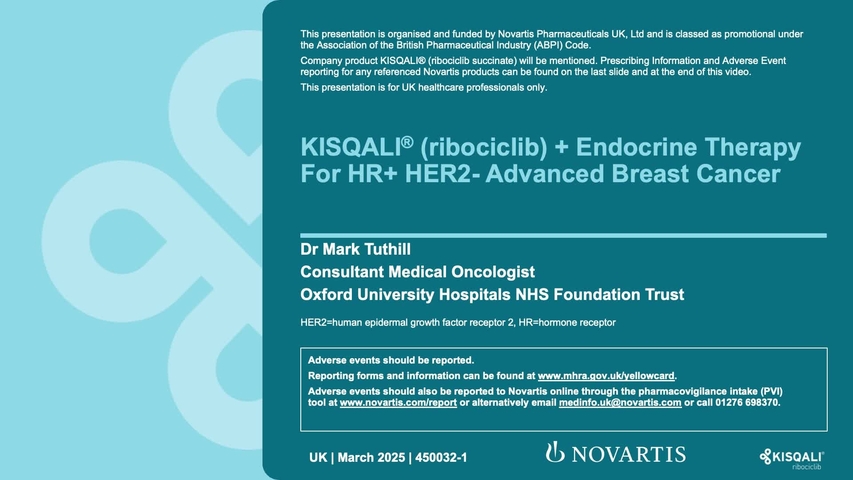

Dr Mark Tuthill patient case study
Indications:1
Early breast cancer (eBC)
KISQALI, in combination with an aromatase inhibitor (AI), is indicated for the adjuvant treatment of patients with hormone receptor (HR)-positive, human epidermal growth factor receptor 2 (HER2)-negative eBC at high risk of recurrence (see section 5.1 of the SmPC for selection criteria).
In pre/perimenopausal women, or in men, the AI should be combined with a luteinising hormone-releasing hormone (LHRH) agonist
Advanced breast cancer (aBC)
KISQALI is indicated for the treatment of women with HR+/HER2– locally advanced or metastatic breast cancer in combination with an AI or fulvestrant as initial endocrine-based therapy, or in women who have received prior endocrine therapy (ET).
In pre/perimenopausal women, the ET should be combined with an LHRH agonist
KISQALI is not recommended to be used in combination with tamoxifen.
Join Dr Mark Tuthill as he shares a case study of his 75-year-old patient who presented with metastatic breast cancer, exploring dose modifications in response to adverse events.
Learn more about the safety profile of KISQALI in aBC
Learn more about efficacy in postmenopausal women with HR+/HER2– aBC
aBC, advanced breast cancer; AI, aromatase inhibitor; eBC, early breast cancer; ET, endocrine therapy; HER2–, human epidermal growth factor receptor 2-negative; HR+, hormone receptor-positive; LHRH, luteinising hormone-releasing hormone; SmPC, summary of product characteristics.
Reference
KISQALI® (ribociclib) Summary of Product Characteristics.
UK | September 2025 | FA-11470852
Adverse events should be reported. Reporting forms and information can be found at www.mhra.gov.uk/yellowcard. Adverse events should also be reported to Novartis online through the pharmacovigilance intake (PVI) tool at www.novartis.com/report, or alternatively email [email protected] or call 01276 698370.


